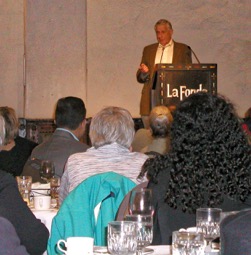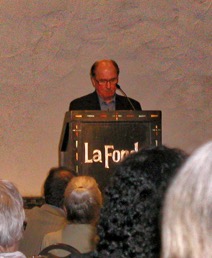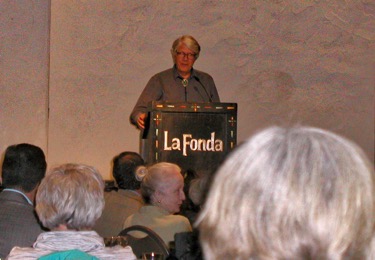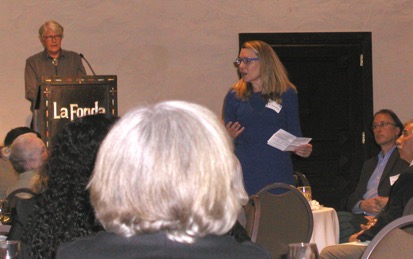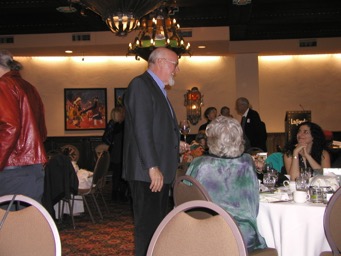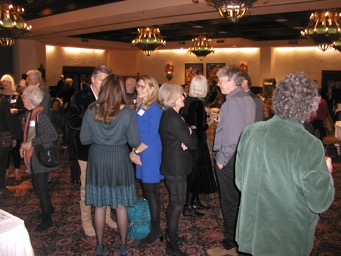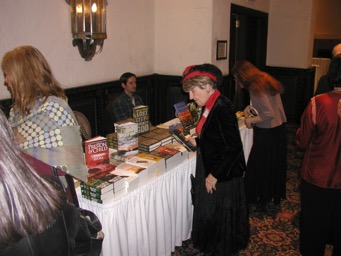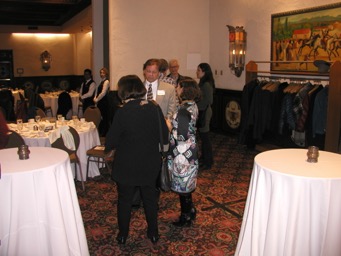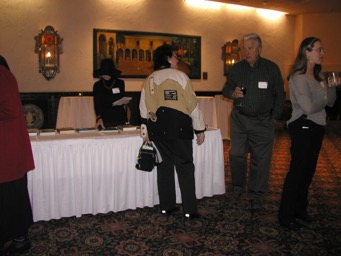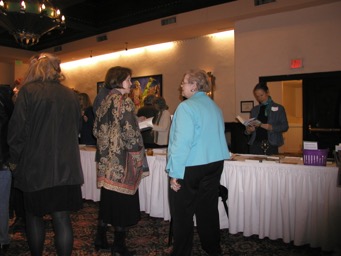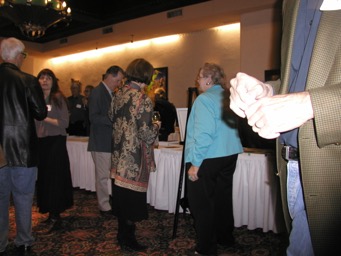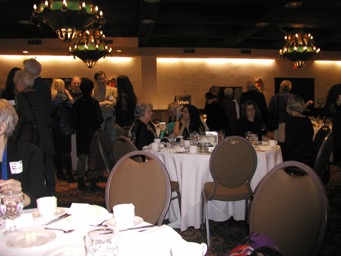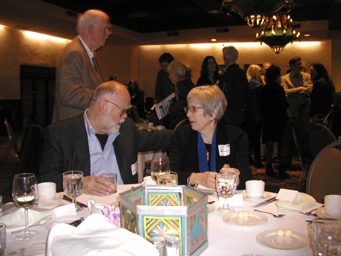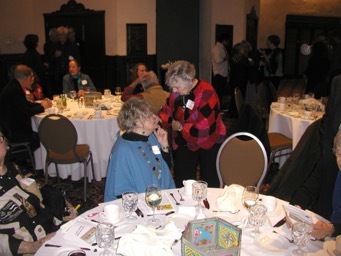The First New Mexico Writers Dinner
A wrap-up of the First New Mexico Writers Dinner — a huge success by the way! And a few rants on the state of affairs both in the book world and in politics.


We attended the first New Mexico Writers Dinner on March 2, at La Fonda in Santa Fe. It was a successful and positive evening. The crowd, over the number set to make it work, was a mix of authors, publishers, booksellers, publicists, and assorted other folks associated with books. There may even have been a few readers in attendance!
The evening was put together by James (Jamie) McGrath Morris. The food was delicious! Really! And there was a Silent Auction of signed books and book related items. The big item was the Ricardo Caté painting of a “Farewell To Arms” bought by Jamie. All the money raised goes to scholarships for up-and-coming writers.
There were 2½ speeches at dinner. Don Lamm, a retired NYC editor and publisher, spoke about the state of the publishing industry — not good. Options are shrinking and if you don’t market and push your book, no one will. David Morrell introduced Douglas Preston. Preston talked about the importance of working together and how the forces of evil wanted your material for free. As the Donald would say, SAD!
The state of publishing and books is changing FAST! No longer is it valued to read books. SAD AGAIN!
SEE LOADS OF PHOTOS AT THE END
Barbe Awalt
Double Standards . . . Just Saying!
US Supreme Court discusses free speech & social media
During oral arguments this week in a case before the US Supreme Court, the justices mostly seemed to agree that access to social media is worthy of constitutional protection. And why shouldn’t it be? The web, and specifically social media, is where civic life happens now. As justice Elena Kagan put it, “Everybody is on Twitter.” (She was referring specifically to people in US government—senators, governors, the president.) Kagan also noted that 50 million Americans access social media every week to express their faith, and that pretty much anyone under 35 discovers news on sites like Facebook, saying, “These sites have become embedded in our culture as ways to communicate and ways to exercise our constitutional rights, haven’t they?” Kagan and her fellow justices were hearing arguments in Packingham v. North Carolina, a case challenging a state law limiting individual social media access for violating freedom of speech as guaranteed by the First Amendment of the US Constitution. The discussion touched on comically postmodern questions‚ like the distinction between Snapchat and Twitter, and what precisely constitutes an online profile. The transcript to the Feb. 27 high court session would have seemed like science fiction to legal scholars of the pre-digital age.
Justice Samuel Alito quipped, “Now, I know there are people who think that life is not possible without Twitter and Facebook and these things, and that 2003 was the dark ages.” He wondered whether these sites are really vital to American society. Justice Anthony Kennedy appeared to think so. “Well, it seems to me that the sites… and their utility and extent of their coverage are greater than the communication you could ever have, even in the paradigm of public square,” he said. The justices must decide if the First Amendment right to freedom of speech extends to the internet, and if so, to what extent the government can limit an individual’s online access. The individual here is Lester Packingham, who pled guilty to statutory rape when he was 21, served his sentence, and remains a sex offender for life.
Under North Carolina law, he is forever prohibited from accessing commercial social media. But in 2010, Packingham signed up for Facebook, using an alias (his first and middle name). He was caught after commenting on a traffic ticket dismissal, and charged with a felony. Packingham challenged the law as violating his First Amendment right to freedom of speech. To be clear, freedom of speech here does not refer to actual speaking—his offense was signing up for a Facebook account, not anything he said. Still, First Amendment protections extend to accessing information (for instance, the speech of government representatives who use Twitter). The state may be able to infringe on a constitutionally protected right, but it must show that it has a compelling interest in doing so, and that it’s doing so in the least restrictive way. North Carolina’s statute appears to fail the second part of this two-pronged legal test. The state admitted it’s infringing on speech implicated by the constitution, and claims to be compelled to do so to protect children from predators. Limiting access to social media is the least restrictive way to achieve that goal, North Carolina senior deputy attorney general Robert Montgomery argued. But the justices disagreed, pretty heartily.
Among other complaints, the law’s demands seemed to the justices to be too broad and unclear.
“Here, you take a group of people who’ve done something wrong, been fully punished, and you’re saying that they might say something to somebody which would be dangerous. And you’re right; it might be,” said justice Stephen Breyer. Still, that’s not enough to support infringing free speech. Breyer asked if a state may prohibit “convicted swindlers” from going on Facebook or sites where money is discussed. “[Y]ou know, pretty soon, you’re going to have everybody convicted of different things not being able to go anywhere and discuss anything,” he observed. North Carolina’s law is also difficult to interpret. The state makes murky distinctions, restricting only sites with certain types of user profiles linking to other users. Twitter is taboo but the New York Times online is not, for example, which bothered justice Sonia Sotomayor. She proffered a print-out of the online newspaper showing users commenting and displaying profile pictures, asking what the difference was. Montgomery said in the state’s defense that Facebook will reveal whether a kid likes puppies and has divorced parents, while a newspaper user profile or even school websites—which are legally accessible to sex offenders under the challenged law—won’t provide personal details.
Again, the court was dubious. Justice Ruth Bader Ginsberg said: Even if the New York Times is not included, the point is that these people are being cut off from a very large part of the marketplace of ideas. And the First Amendment includes not only the right to speak, but the right to receive information. With this statement, she revealed her position on social media’s importance in American society, a view that seemed widely shared on the bench. We’ll find out what the court really thinks sometime around May when opinions are written. Packingham could prove significant, establishing the place of Facebook and its ilk in American life and law. — with a little help from Quartz News
UPCOMING CALENDAR:
Rio Grande Books
April 8: Gallup Public Library, 9am-5pm "Author Fair"
April 20-22: Arizona-NM Historical Society Conference, Flagstaff, AZ
June 16-18: Sacred Art Market, Gallup Cathedral
July 15: Lavender in the Village, Los Ranchos Agri Center
Pat Hodapp
April 23 : Collected Works, 2pm "Santa Fe Bucket List"
Henrietta Christmas & Paul Rhetts
April 30 : Santa Fe Public Library, 2pm "Basic Genealogy Checklist: 101 Tips & Tactics to Finding Your Family History"
Loretta Hall
March 18 : Santa Fe Public Library, 2pm "New Mexico's Contribution to Space Travel"
April 5: Bear Canyon Senior Center, 10:00-11:30, "NM is a Treasure Trove of Space History"
April 7, 14, 21, 28: LifeLong Learning Institute class, Covenant Presbyterian Church, 9315 Candelaria Rd NE, Albuquerque, 10:00-12:00, "New Mexico's Contributions to Space Travel"
May 3, Bear Canyon Senior Center, 10:00-11:30, "Getting Men to the Moon: Behind-the-Scenes Stories"
July 13: OASIS, 1:00-2:30, "What Sex Differences Mean for Space Travel"
Ross Van Dusen
May 20 : Treasure House Books, 1pm "Lyle Got Stuck in a Tree"
The evening was put together by James (Jamie) McGrath Morris. The food was delicious! Really! And there was a Silent Auction of signed books and book related items. The big item was the Ricardo Caté painting of a “Farewell To Arms” bought by Jamie. All the money raised goes to scholarships for up-and-coming writers.
There were 2½ speeches at dinner. Don Lamm, a retired NYC editor and publisher, spoke about the state of the publishing industry — not good. Options are shrinking and if you don’t market and push your book, no one will. David Morrell introduced Douglas Preston. Preston talked about the importance of working together and how the forces of evil wanted your material for free. As the Donald would say, SAD!
The state of publishing and books is changing FAST! No longer is it valued to read books. SAD AGAIN!
SEE LOADS OF PHOTOS AT THE END
Barbe Awalt
Double Standards . . . Just Saying!
- It's okay for Mike Pence to use a private email account on AOL for government business from 2013 to 2017 and get hacked, but … !
- Mike Flynn gets canned for violating laws on talking to foreign governments but when Jared Kushner and Jeff Sessions do it, no penalty at all!
- Local law enforcement must protect the President no matter where he is, but local citizens end up paying for this service. Shouldn't the Federal government pay for this or maybe even the recipient of the protection. And, why do the President's adult children get special security when they travel for their business. They should be paying for it, not the citizens of this country.
- Handicapped get preferential parking locations all over the place. No problem with that, but why do they get the space for free, when adjacent spaces cost the users? Glad to give the handicapped easier access, but that doesn't necessarily translate into FREE when everyone else must PAY. By the way, I am handicapped and this just does not make sense.
- The President said for almost 18 months he was the smartest person in the room and that he knew more about health care and reform than anyone on the face of the earth. Now he says it is a lot more complicated than he originally thought. Ya think! On the same note, the Republicans in Congress spent 8 years complaining and railing against ACA; okay, so where are their great ideas for fixing it? I guess it is just okay to stick it to the poor, under-privileged, and under-served and take away one of their only hopes of making things better for themselves. Oh, well . . .
- The President is jacking up the idea that increasing military spending by $54 billion will make the US strong again. He proposes the money be split almost evenly across the armed services. Just how will 100 new fighter jets make us more secure against the global insurgency that he has caused? His rhetoric and policies have emboldened our enemies in Russia, China, North Korea, and even ISIS. How will 25 planes for each of these fronts help. Wouldn't dialing back some of his own threats be of even more help? Wouldn't we all feel more secure if the President stopped wasting time tweeting all day long and just spend that time building a plan that would help all of us?
US Supreme Court discusses free speech & social media
During oral arguments this week in a case before the US Supreme Court, the justices mostly seemed to agree that access to social media is worthy of constitutional protection. And why shouldn’t it be? The web, and specifically social media, is where civic life happens now. As justice Elena Kagan put it, “Everybody is on Twitter.” (She was referring specifically to people in US government—senators, governors, the president.) Kagan also noted that 50 million Americans access social media every week to express their faith, and that pretty much anyone under 35 discovers news on sites like Facebook, saying, “These sites have become embedded in our culture as ways to communicate and ways to exercise our constitutional rights, haven’t they?” Kagan and her fellow justices were hearing arguments in Packingham v. North Carolina, a case challenging a state law limiting individual social media access for violating freedom of speech as guaranteed by the First Amendment of the US Constitution. The discussion touched on comically postmodern questions‚ like the distinction between Snapchat and Twitter, and what precisely constitutes an online profile. The transcript to the Feb. 27 high court session would have seemed like science fiction to legal scholars of the pre-digital age.
Justice Samuel Alito quipped, “Now, I know there are people who think that life is not possible without Twitter and Facebook and these things, and that 2003 was the dark ages.” He wondered whether these sites are really vital to American society. Justice Anthony Kennedy appeared to think so. “Well, it seems to me that the sites… and their utility and extent of their coverage are greater than the communication you could ever have, even in the paradigm of public square,” he said. The justices must decide if the First Amendment right to freedom of speech extends to the internet, and if so, to what extent the government can limit an individual’s online access. The individual here is Lester Packingham, who pled guilty to statutory rape when he was 21, served his sentence, and remains a sex offender for life.
Under North Carolina law, he is forever prohibited from accessing commercial social media. But in 2010, Packingham signed up for Facebook, using an alias (his first and middle name). He was caught after commenting on a traffic ticket dismissal, and charged with a felony. Packingham challenged the law as violating his First Amendment right to freedom of speech. To be clear, freedom of speech here does not refer to actual speaking—his offense was signing up for a Facebook account, not anything he said. Still, First Amendment protections extend to accessing information (for instance, the speech of government representatives who use Twitter). The state may be able to infringe on a constitutionally protected right, but it must show that it has a compelling interest in doing so, and that it’s doing so in the least restrictive way. North Carolina’s statute appears to fail the second part of this two-pronged legal test. The state admitted it’s infringing on speech implicated by the constitution, and claims to be compelled to do so to protect children from predators. Limiting access to social media is the least restrictive way to achieve that goal, North Carolina senior deputy attorney general Robert Montgomery argued. But the justices disagreed, pretty heartily.
Among other complaints, the law’s demands seemed to the justices to be too broad and unclear.
“Here, you take a group of people who’ve done something wrong, been fully punished, and you’re saying that they might say something to somebody which would be dangerous. And you’re right; it might be,” said justice Stephen Breyer. Still, that’s not enough to support infringing free speech. Breyer asked if a state may prohibit “convicted swindlers” from going on Facebook or sites where money is discussed. “[Y]ou know, pretty soon, you’re going to have everybody convicted of different things not being able to go anywhere and discuss anything,” he observed. North Carolina’s law is also difficult to interpret. The state makes murky distinctions, restricting only sites with certain types of user profiles linking to other users. Twitter is taboo but the New York Times online is not, for example, which bothered justice Sonia Sotomayor. She proffered a print-out of the online newspaper showing users commenting and displaying profile pictures, asking what the difference was. Montgomery said in the state’s defense that Facebook will reveal whether a kid likes puppies and has divorced parents, while a newspaper user profile or even school websites—which are legally accessible to sex offenders under the challenged law—won’t provide personal details.
Again, the court was dubious. Justice Ruth Bader Ginsberg said: Even if the New York Times is not included, the point is that these people are being cut off from a very large part of the marketplace of ideas. And the First Amendment includes not only the right to speak, but the right to receive information. With this statement, she revealed her position on social media’s importance in American society, a view that seemed widely shared on the bench. We’ll find out what the court really thinks sometime around May when opinions are written. Packingham could prove significant, establishing the place of Facebook and its ilk in American life and law. — with a little help from Quartz News
UPCOMING CALENDAR:
Rio Grande Books
April 8: Gallup Public Library, 9am-5pm "Author Fair"
April 20-22: Arizona-NM Historical Society Conference, Flagstaff, AZ
June 16-18: Sacred Art Market, Gallup Cathedral
July 15: Lavender in the Village, Los Ranchos Agri Center
Pat Hodapp
April 23 : Collected Works, 2pm "Santa Fe Bucket List"
Henrietta Christmas & Paul Rhetts
April 30 : Santa Fe Public Library, 2pm "Basic Genealogy Checklist: 101 Tips & Tactics to Finding Your Family History"
Loretta Hall
March 18 : Santa Fe Public Library, 2pm "New Mexico's Contribution to Space Travel"
April 5: Bear Canyon Senior Center, 10:00-11:30, "NM is a Treasure Trove of Space History"
April 7, 14, 21, 28: LifeLong Learning Institute class, Covenant Presbyterian Church, 9315 Candelaria Rd NE, Albuquerque, 10:00-12:00, "New Mexico's Contributions to Space Travel"
May 3, Bear Canyon Senior Center, 10:00-11:30, "Getting Men to the Moon: Behind-the-Scenes Stories"
July 13: OASIS, 1:00-2:30, "What Sex Differences Mean for Space Travel"
Ross Van Dusen
May 20 : Treasure House Books, 1pm "Lyle Got Stuck in a Tree"
